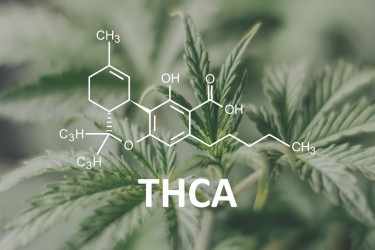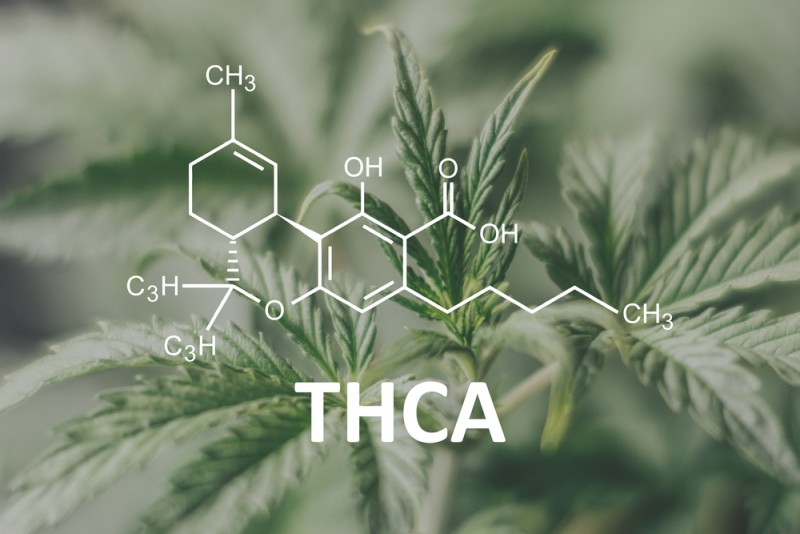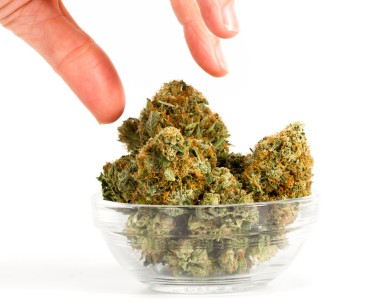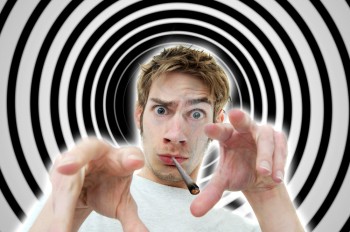
You've almost certainly heard of THC. Roughly half of Americans say they've tried marijuana, and THC is the cannabinoid that's responsible for its psychoactive effects. Since Colorado and Washington became the first states to legalize recreational marijuana use in the U.S., the majority of the country has followed suit. It's only illegal in 12 states, and even then, it's decriminalized in some places. In the near future, it may even be moved to a Schedule 3 drug.
However, THC isn't the only compound in marijuana that's gained popularity. It's one of over 100 cannabinoids that have been identified, and each one has its own set of potential therapeutic benefits. CBD is the most well-known, followed by CBG, CBN, and delta-8 THC. However, there's another cannabinoid that's gaining traction: THCA.
What Is THCA?
THCA (short for tetrahydrocannabinolic acid) is the precursor molecule to THC. It occurs naturally in raw cannabis (whereas THC doesn't) and converts to THC when the flower is exposed to heat and light.
When cannabis is dried and cured, THCA slowly becomes THC. This is why inhaling marijuana has such a strong effect; it's full of potent THC molecules that were created from THCA. THCA isn't the only cannabinoid acid you'll find in cannabis. Others include:
-
CBDA (cannabidiolic acid)
-
CBGA (cannabigerolic acid)
-
CBCA (cannabinolacetic acid)
-
CBGVA (cannabigevarinic acid)
-
THCVA (tetrahydrocannabivarin acid)
Since THCA isn't psychoactive, you won't get "high" if you consume it in its natural form. However, there's growing evidence that it has its own unique set of therapeutic benefits, some of which are similar to THC.
The Science Behind THCA
THCA is the compound that eventually transforms into THC, a process encouraged by heat, time, and light through a process known as decarboxylation. This phenomenon involves the shedding of a carboxylic acid group, thus altering the compound's structure and effects.
A distinguishing feature of THCA is its instability under controlled storage conditions. While it is prevalent in fresh cannabis, it easily transitions into THC when exposed to certain elements, making it a dynamically changing compound.
Even at temperatures ranging between 4ºC and 18ºC (39ºF to 64ºF), THCA tends to decarboxylate, a quality that points to its sensitive nature and the intricate care needed in its preservation. This characteristic presents a conundrum in achieving precise laboratory results; 'THC contamination' is practically a given with all THCA testing.
What Does THCA Do Inside the Human Body?
While it might appear as a challenge in the scientific community, it is this very attribute that has piqued the curiosity of researchers and enthusiasts alike. Everything that exists in the world of cannabis compounds has a role to play in the human body through the Endocannabinoid System (ECS). This remarkable system, discovered recently thanks to the pioneering work of Raphael Mechoulam, stands as a guardian of homeostasis, ensuring a balanced internal environment for various vital systems, including the brain and immune system.
THCA's large molecular size prevents it from binding to the CB1 receptors, which are responsible for THC's psychoactive effects. It also does not bind to CB2 receptors, which are primarily responsible for anti-inflammatory responses. THCA still produces an array of therapeutic effects. According to 2023 research, it's been shown to be an effective anti-inflammatory agent. It also improves neuroproductivity, making it potentially beneficial for treating neurodegenerative diseases. Some research on rats has shown THCA to reduce nausea and vomiting as well.
THCA vs. THCV
THCV is another interesting cannabinoid found in cannabis. It's similar to THCA in that it doesn't bind to the CB1 receptor, but it has different effects on the body. Unlike THCA, THCV binds to CB1 and CB2 receptors. It can act as an appetite suppressant, making it a potential treatment for obesity-related conditions, including diabetes.
THCV is technically a psychoactive compound, but its effects are quite different from those of THC. Only very high dosages result in a feeling of euphoria, and its effects wear off sooner than the effects of THC. THCV is typically present in low concentrations, but certain strains can have higher levels of THCV compared to others. Most of the time, these strains also have higher THC content than the average strain.
THCA vs. THC
Since THCA decarboxylates even at low temperatures, smoking or vaping cannabis with a "high THCA content" won't necessarily mean you're getting more THCA (that is, if you decide to smoke or vape it). The process of burning or heating the marijuana will cause all of it to turn into THC.
To isolate the THCA and experience its effects, users need to use alternative methods of consuming cannabis. They have to take the flower and extract the cannabinoids to preserve the THCA's properties. By consuming high-THCA cannabis, you're able to reap its potential benefits without any of the psychoactivity associated with THC.
Here's a look at some of the key differences between THCA and THC:
Potency
THCA isn't seen as a potent compound at all. Its psychoactive effects are practically nonexistent, like many cannabinoids. THC is the only one that produces a noticeable high. THCA becomes potent once it's heated, burned, or cured. Crystalline THCA can be packaged and sold in high concentrates, so cooking, vaping, or smoking it could have extremely potent effects
In fact, that's usually the main reason people buy high-THCA flower (like that from Bud Brothers THCA Raleigh). Due to the much higher concentration of THC this process produces, it sometimes yields a more potent high than regular marijuana of the same caliber.
Benefits
THCA has been studied for its potential anti-inflammatory and neuroprotective benefits, so it may be beneficial for treating certain chronic conditions (neurodegenerative diseases). It's also been studied for its ability to reduce nausea and improve appetite. It's also worth noting that THCA can be enjoyed without being intoxicated, which is a huge benefit for those who don't want to experience the effects of THC. As the main psychoactive compound in cannabis, THC is a lot more heavily researched. According to an extensive body of research spanning decades, benefits include:
-
A mind-altering effect users describe as "energizing," "elevating," "relaxing,” "pleasurable," or "psychedelic.”
-
Pain relief from chronic pain syndromes like Fibromyalgia, Arthritis, and Multiple Sclerosis
-
Appetite stimulation for chemotherapy patients undergoing cancer treatment
-
Neuroprotective qualities to protect nerve cells from damage and degeneration
-
Improved sleep quality and duration
-
Chronic pain relief
-
Relief from stress, anxiety, PTSD, depression, and other mood disorders
-
Overall improved mood and outlook on life
In general, THC serves most of the "benefits" of all the other cannabinoids. However, it's also mind-altering, which is a turn-off for cannabis users who only want the therapeutic benefits. THCA is among the several cannabinoids that helps fill this gap.
Consumption
It's easy to use THC. There are seemingly countless options for consuming cannabis and cannabis extracts, each with a different level of potency and control. Marijuana users can choose to smoke or vape however they like. They also have countless options for edibles, including cannabis butter, which they can use to cook THC into just about anything at home. Really, the only big decision they have to make is, "How much THC do I want to consume?"
However, THCA is more complicated. It isn't enough for THCA users to find a way to ingest it without cooking, burning, or vaping it. It can turn into THC even under slight warmth or sunlight. If it's forgotten in the car for too long, it's ruined. The only two options for THCA users are:
-
Purchasing isolated THCA extract
-
Consuming freshly harvested raw cannabis plants
Most often, THCA users blend it into a juice or smoothie, as its bitter flavor is, according to some, nearly unbearable on its own. It can also be mixed into other food items and consumed that way (as long as they are cold foods). For anyone willing to put up with the taste, it's also possible to consume the cannabis flower as-is.
Legality
At the federal level, THCA isn't illegal, but it can quickly turn into THC (often without the user's awareness). And, THC is generally the reason people use cannabis. It could be considered an analog of THC and still be subject to federal law. under the Analogue Act.
If you're purchasing a THC product (such as cannabis flower) with THCA content, it will still be subject to cannabis laws in your state, even if you don't intend to use the substance for its psychoactive effects.
It's important to research the local laws and regulations before using THCA products. In a legal state, you might be able to purchase it with relative ease. However, it's always better to err on the side of caution and double-check first.
Final Thoughts
Compared to other cannabinoids, THCA is rare (and tough to come by). Since it can't be heated even a little bit, it's certainly less convenient than many other cannabinoids with similar benefits. It's a promising compound many enjoy using for its therapeutic, non-psychoactive properties.
When you're shopping for THCA products, it's more important than ever to look for ones from reputable growers. Since you'll likely be consuming the product outright, you don't want nasty chemicals or metals inadvertently entering your body, and you don't want to risk consuming THC when you don't intend to.
MORE ON THCA, READ ON...
SHOULD YOU SMOKE OR EAT THCA, IS THERE A BEST WAY TO INGEST IT?






